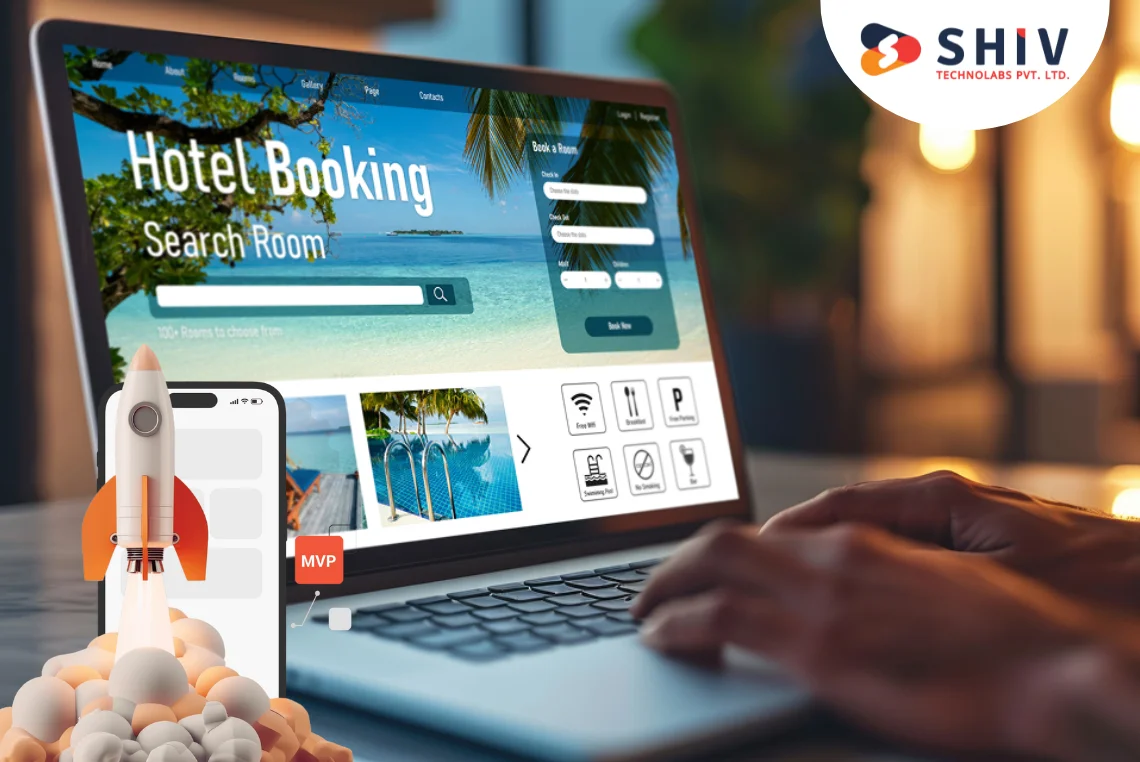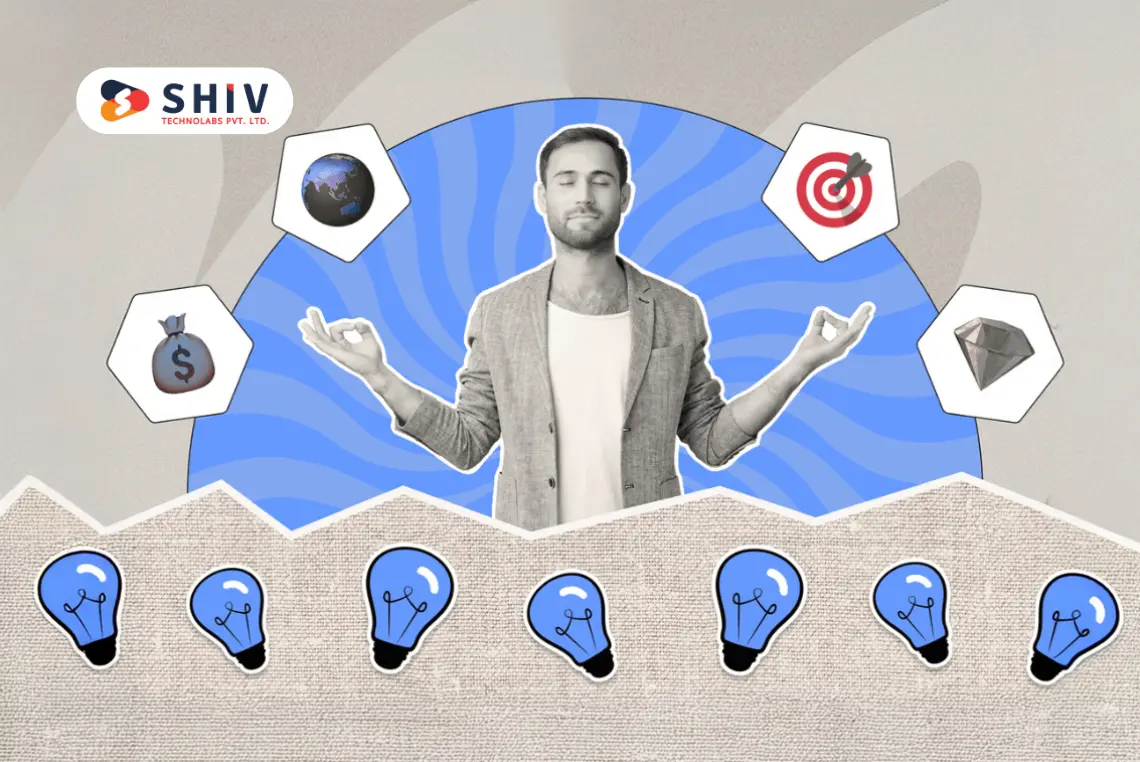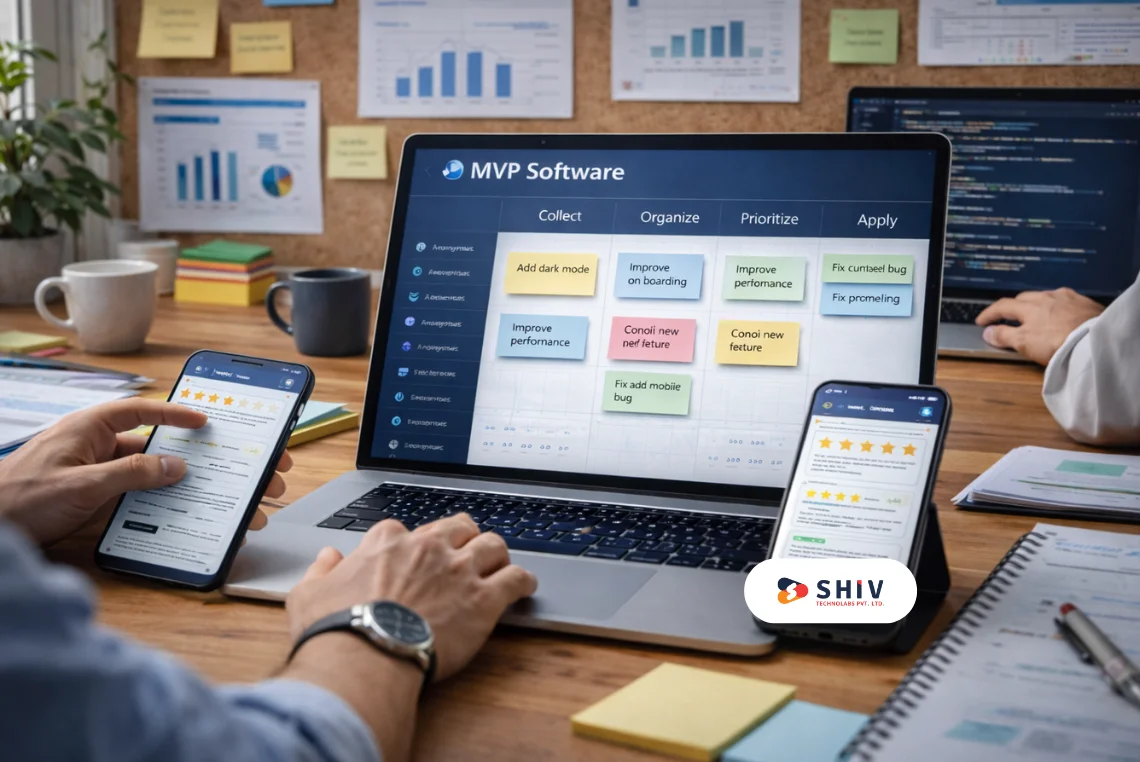Table of Contents
Launching a booking product without early proof is risky. An MVP development service helps hotels test real demand with a small, usable product. You release core booking features, learn from guest behavior, and adjust fast. With MVP development for hotel booking, you cut waste, speed learning, and focus on what guests value most. That focus saves time, trims cost, and guides every next sprint with clear data.
Hospitality runs on trust, convenience, and timing. An MVP lets you validate rates, rooms, and offers with real guests before a large rollout. You track conversions, drop-offs, and support tickets to confirm product fit. Teams act on insights, improve flows, and add features only when numbers back the move. This approach reduces rework, lowers risk, and sets a clean path to scale.
Why Do Hotels and Resorts Need MVP Development for Booking Platforms?
What business problems does an MVP solve in hospitality?
Traditional booking projects often grow big, slow, and pricey before guests even try them. An MVP reduces scope to the most useful paths, so you can test quickly and measure what matters. You prove value with smaller releases, short feedback cycles, and clear success metrics. That rhythm turns assumptions into facts and keeps the build on track.
Working with an MVP development company for hospitality adds playbooks from similar launches. You get faster delivery, better prioritization, and sharper analytics from day one. Teams ship a lean booking flow, gather guest input, and improve the next release with confidence. Less guesswork means smarter budgets, quicker wins, and fewer surprises during growth.
Benefits:
- Faster market validation
- Guest feedback loop
- Lower development cost
- Early competitive advantage
How does MVP reduce risk for hotel booking startups?
With hotel booking MVP development, product teams test core paths with real guests before big spending. You release a small, reliable flow, measure conversion and drop-off, and improve the next sprint with facts. This method trims rework, shortens payback periods, and builds internal confidence for future releases.
Consider a small hotel testing direct bookings against OTAs. The MVP compares rates, room types, and add-ons, then tracks cart exits, refunds, and support tickets. A boutique resort can trial a loyalty app with points, perks, and upgrade prompts, then refine offers based on repeat visits and stay length. Both cases use simple A/B tests and analytics to confirm value before adding complex tools.
How to Build an MVP for Hotel Booking System
A clear build path keeps scope tight and outcomes measurable. Start with guest goals, define must-have flows, and connect only the integrations needed to launch. Map success metrics to each release so every sprint answers a real business question.
What features should a hotel booking MVP include first?
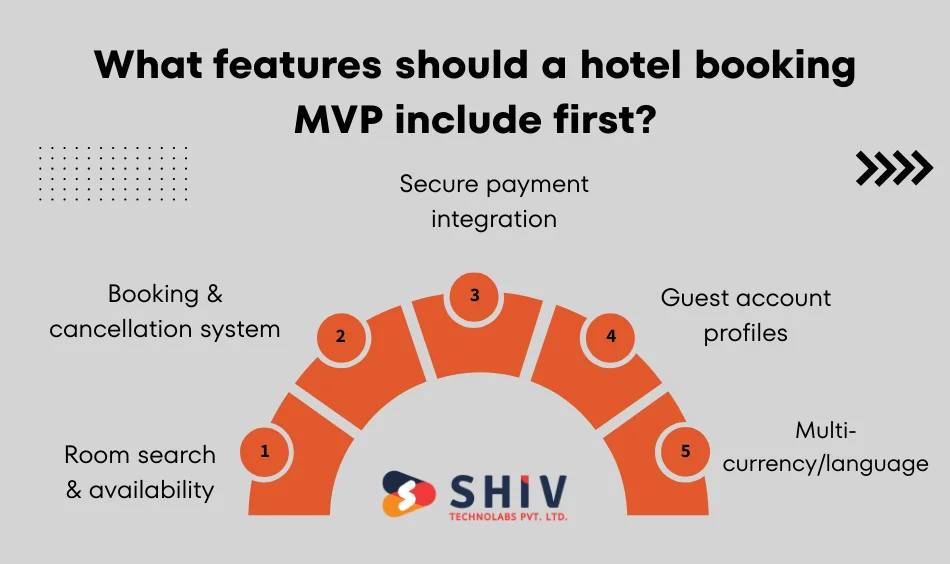
If you ask how to build MVP for hotel booking system, begin with the smallest flow that can take a booking. Guests must find rooms, pick dates, pay, and receive confirmations without confusion. Everything else can follow. That first release should also collect the right data so you can learn fast and plan the next sprint with certainty.
Core features to ship first:
- Room search & availability
- Booking & cancellation system
- Secure payment integration
- Guest account profiles
- Multi-currency/language
Keep the UI clean, the copy clear, and the steps short. Add rate plans, promo codes, and upsells only after the base flow delivers steady conversion. If your market includes walk-ins or call-ins, support manual reservations in the same system. That link prevents double bookings, improves inventory accuracy, and sets the stage for add-ons like loyalty, gift cards, and partner bundles when the numbers support them.
What platforms work best for MVP app development in hospitality?
Platform choice shapes speed, budget, and guest reach. For MVP app development for hotels and resorts, decide based on launch deadline, device needs, and staff workflows. Start where guests already book, then add channels once conversion data supports the expansion.
| Platform | Speed to Market | Cost | Scalability | UX |
|---|---|---|---|---|
| Web | Fast | Lower | Medium | Good |
| Mobile | Medium | Higher | High | Excellent |
| Hybrid | Balanced | Medium | High | Very Good |
Web suits quick releases and broad device coverage without app-store steps. Teams ship a responsive booking flow, admin tools, and promo pages within weeks. Web also pairs well with SEO, metasearch, and OTA campaigns that push traffic into the new booking path.
Native mobile apps fit loyalty, repeat stays, and upsells that benefit from push notifications. You gain richer device access, smoother animations, and better session stability. Expect higher initial cost and more time for app-store reviews, but stronger retention from guests who book often.
Hybrid offers one codebase for both stores, with close-to-native performance. You move faster than two native builds and keep maintenance simpler long term. Validate the first release on a narrowed feature set, then tune performance around search, cart actions, and payments.
Choose web first if you need fast traction, frequent content changes, and simple staff onboarding. Pick native when loyalty, offline support, and device features drive lifetime value. Select a hybrid to balance the budget and reach while proving product fit on both major stores.
Tie platform choice to integrations and operations from day one. Confirm payment gateways, currency rules, and refund flows across markets. Map OTA, GDS, and channel connections if inventory must sync in real time. Plan error states, audit logs, and rate rules so finance and front desk teams can act quickly.
Close the decision with data, not guesswork. Run soft launches for each platform, watch funnel health, and compare cohorts. If one channel outperforms the rest, move it to the next milestone, then grow the slower one with targeted fixes. This steady approach keeps the roadmap clear and the budget under control.
Cost of Developing an MVP for Hotel Booking Platforms
MVP costs depend on scope, features, integrations, and region, so clear planning matters from day one. A tight plan aligns milestones with business goals, keeps teams focused, and protects budget during early releases.
What factors affect the cost of hotel booking MVP development?
In MVP software development for hospitality industry projects, real cost drivers appear as soon as scope becomes concrete. Your booking flow, target devices, and required integrations define the workload, team mix, and release timeline. Plan only what supports conversion and daily operations for the first live month across priority channels. Team seniority and time zone overlap can speed sprints and reduce costly miscommunication during handoffs. Clear ownership for product, design, and engineering avoids churn and keeps decision cycles short during build.
Cost drivers:
- UX/UI design complexity
- Tech stack used
- Third-party integrations
- API connections (payment, OTA)
- Development team location
Nonfunctional needs also affect cost, including analytics, monitoring, security hardening, and audit trails for payments and refunds. Set clear targets for uptime and support response, and choose integrations that shorten delivery without hidden fees. Pick a delivery model that matches your budget and cadence, such as fixed-price milestones or time-and-materials. Set transparent change-control rules so scope shifts do not break calendars, rates, or channel sync.
What is the average cost range of a hotel booking MVP?
Most teams ask about hotel booking MVP development cost, and the honest answer depends on region and complexity. Budgets rise with native mobile apps, custom design systems, multi-currency rules, and deep connections to OTAs or PMS. Lean web releases with standard gateways and basic reporting usually sit at the lower end of estimates. Expect higher spend for complex rate plans, white-label portals, and loyalty engines that require careful testing. Pick a vendor model that fits your cash flow, reporting needs, and risk tolerance. Many teams start with fixed milestones, then move to monthly retainers for growth work later.
Cost breakdown by region:
| Region | Hourly Rate | Cost Range (MVP) |
|---|---|---|
| USA/Canada | $80–$150/hr | $60K–$120K |
| UK/Europe | $60–$120/hr | $40K–$90K |
| India/Asia | $25–$50/hr | $15K–$40K |
| Eastern Europe | $40–$80/hr | $25K–$60K |
Scope, contracts, and vendor maturity also shape totals, so request a clear estimate by milestone. Plan buffers for app-store reviews, payment checks, and legal policies across key regions before launch. Those steps add time, yet early approvals prevent late surprises when traffic grows after marketing begins. Always compare quotes against the regional rates below and the planned feature set ahead of kickoff.
Technology Choices for Hotel Booking MVP Development
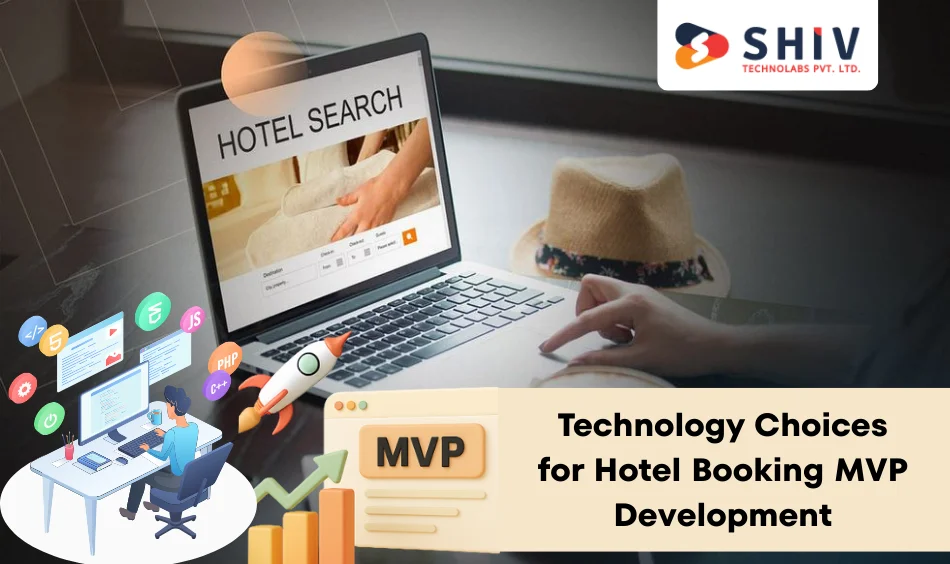
Which tech stacks are best for hotel booking MVPs?
Strong technology for hotel booking platform development helps teams ship fast and scale with confidence. Pick tools your developers know well, confirm gateway SDKs, and keep the stack small.
Frontend Development: React, Angular, Vue
React moves quickly with flexible patterns and rich UI libraries. Angular adds clear structure for larger teams, while Vue offers a light footprint with simple onboarding.
Backend Development: Node.js, Django, Laravel
Node.js supports high I/O and one language across the stack. Django brings built-in admin and safety features, while Laravel speeds CRUD work with tidy routing.
Mobile Development: Flutter, React Native
Flutter and React Native give you one codebase for both stores. Push alerts, deep links, and native modules cover loyalty, offers, and secure payments.
Database: PostgreSQL, MongoDB
PostgreSQL fits rate rules, refunds, and reports with strong consistency. MongoDB suits flexible content, promos, and fast experiments during pilot stages.
Cloud: AWS, Azure, Google Cloud
Managed services add queues, caching, logging, and backups from day one. Pick regions near guests, set autoscaling rules, and keep access controls tight.
Why cloud and integrations matter in hospitality MVPs?
Cloud tools handle traffic spikes during campaigns and holidays. Integrations connect booking engines, CRM, POS, payments, and channels so staff work in one flow. Add retries, rate limits, and audit logs to keep refunds and disputes clear.
Growth Roadmap – Scaling from MVP to Full Booking Platform
How to move from MVP to a full hotel booking system?
Scale in stages: MVP → Pilot → Full Release. Track conversion, refund time, and support load, then add features that lift revenue and repeat stays.
Advanced features to plan next:
- Loyalty & rewards
- Multi-property support
- AI-driven recommendations
- Advanced reporting
What mistakes should hospitality businesses avoid when scaling?
During MVP development for hotel booking, teams sometimes add features without proof or skip API contracts. Avoid overbuilding, weak integration tests, and missing rollbacks that slow releases.
Why Choose Shiv Technolabs for Hospitality MVP Development?
Building a hotel booking MVP needs clear sprints, clean interfaces, and dependable integrations. We plan around conversion goals, staff workflows, and real guest feedback from pilots.
What we deliver:
- End-to-End MVP development for hotels & resorts
- Custom booking engines
- Mobile-first app development
- Tech stack consulting & cloud integrations
- Cost-effective global delivery models
Conclusion
An MVP lets hotels test real guest demand with a small, focused booking flow. You launch faster, measure conversion and refunds across channels, and plan upgrades with clear, shared evidence. That path lowers risk, controls spend, and builds a product that guests actually use during real trips.
Partnering with an MVP Development Company adds tested playbooks, hotel APIs experience, and steady delivery. You gain rapid sprints, clean integrations, and data you can trust when planning the next release. Start small, measure well, grow your booking stack with confidence, and keep teams aligned around clear, simple metrics.
FAQs
How much does MVP development for hotel booking platforms cost?
Budgets typically range from $15K to $120K based on region, scope, and platform mix and timelines. Native apps, complex rates, and deep OTA or PMS connections push estimates toward the higher bands.
Which features should be prioritized in a hotel booking MVP?
Start with room search, live availability, booking and cancellations, secure payments, and guest profiles for core flow. Add multi-currency, multi-language, promo codes, and upsells only after the base funnel shows stable conversion.
What tech stack works best for hotel booking MVP development?
Popular picks include React or Vue on the web, Node.js or Django for APIs, and PostgreSQL for data. For mobile, Flutter or React Native deliver cross-platform releases, while AWS or Azure handle hosting and scaling.
How long does it take to build a hotel booking MVP?
Most teams ship in three to six months, depending on features, integrations, and approval steps. Pilots move faster when product scope is tight, roles are clear, and decisions arrive without long delays.
Why should hotels and resorts start with an MVP instead of full-scale development?
An MVP reduces risk by testing demand early, trimming waste, and focusing investment on proven guest value.

